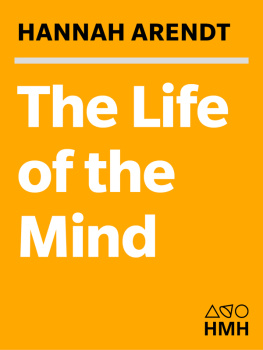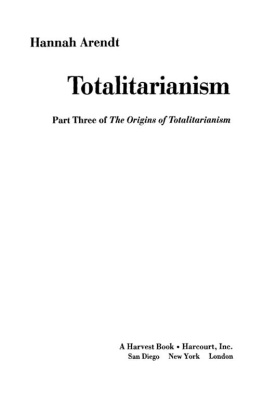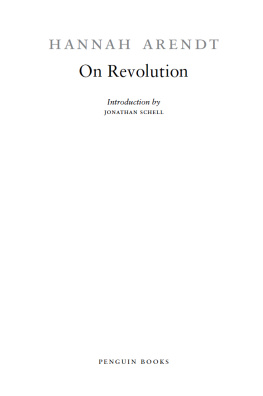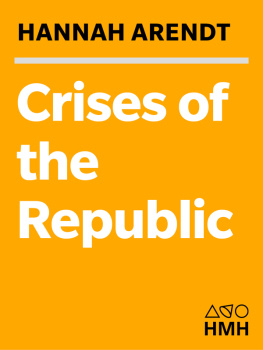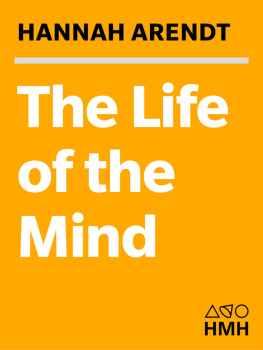Hannah Arendt - The Life of the Mind
Here you can read online Hannah Arendt - The Life of the Mind full text of the book (entire story) in english for free. Download pdf and epub, get meaning, cover and reviews about this ebook. year: 1981, publisher: Houghton Mifflin Harcourt, genre: Science. Description of the work, (preface) as well as reviews are available. Best literature library LitArk.com created for fans of good reading and offers a wide selection of genres:
Romance novel
Science fiction
Adventure
Detective
Science
History
Home and family
Prose
Art
Politics
Computer
Non-fiction
Religion
Business
Children
Humor
Choose a favorite category and find really read worthwhile books. Enjoy immersion in the world of imagination, feel the emotions of the characters or learn something new for yourself, make an fascinating discovery.
- Book:The Life of the Mind
- Author:
- Publisher:Houghton Mifflin Harcourt
- Genre:
- Year:1981
- Rating:5 / 5
- Favourites:Add to favourites
- Your mark:
- 100
- 1
- 2
- 3
- 4
- 5
The Life of the Mind: summary, description and annotation
We offer to read an annotation, description, summary or preface (depends on what the author of the book "The Life of the Mind" wrote himself). If you haven't found the necessary information about the book — write in the comments, we will try to find it.
The Life of the Mind — read online for free the complete book (whole text) full work
Below is the text of the book, divided by pages. System saving the place of the last page read, allows you to conveniently read the book "The Life of the Mind" online for free, without having to search again every time where you left off. Put a bookmark, and you can go to the page where you finished reading at any time.
Font size:
Interval:
Bookmark:
Copyright 1971 by Hannah Arendt
Copyright 1978,1977 by Harcourt, Inc.
All rights reserved. No part of this publication may be reproduced or transmitted in any form or by any means, electronic or mechanical, including photocopy, recording, or any information storage and retrieval system, without permission in writing from the publisher.
For information about permission to reproduce selections from this book, write to Permissions, Houghton Mifflin Harcourt Publishing Company, 215 Park Avenue South, New York, New York 10003.
www.hmhbooks.com
Thinking appeared originally in the New Yorker in somewhat different form.
The quotations from W. H. Auden are from Collected Poems, by W. H. Auden, edited by Edward Mendelson. Copyright 1976 by Edward Mendelson, William Meredith, and Monroe K. Spears, Executors of the Estate of W. H. Auden. The quotation from Rainer Maria Rilke is from Duino Elegies, by Rainer Maria Rilke, translated by J. B. Leishman and Stephen Spender, copyright 1939 by W. W. Norton & Company, Inc., copyright renewed 1967 by Stephen Spender and J. B. Leishman, and is reprinted with the permission of W. W. Norton & Company, Inc., and The Hogarth Press.
The Library of Congress has cataloged the print edition as follows:
Arendt, Hannah.
The life of the mind.
Originally published in two separate volumes with subtitles: Thinking, and Willing.
Includes bibliographical references and indexes.
1. PhilosophyCollected works. I. Title.
B29.A73 1981 110 80-25403
ISBN 0-15-651992-5
eISBN 978-0-547-54147-1
v2.0513
Numquam se plus agere quam nihil cum
ageret, numquam minus solum esse quam
cum solus esset.
CATO
Every one of us is like a man who sees
things in a dream and thinks that he
knows them perfectly and then wakes
up to find that he knows nothing.
PLATO, Statesman
As Hannah Arendts friend and literary executor, I have prepared The Life of the Mind for publication. In 1973 Thinking was delivered in briefer form as Gifford Lectures at the University of Aberdeen, and in 1974 the opening part of Willing as well. Both Thinking and Willing, again in briefer form, were given as lecture courses at the New School for Social Research in New York in 19745 and 1975. The history of the work and of its editorial preparation will be related in the editors post-face to be found at the end of each volume. The second volume contains an appendix on Judging, drawn from a lecture course on Kants political philosophy given in 1970 at the New School.
On Hannah Arendts behalf, thanks are extended to Professor Archibald Wernham and Professor Robert Cross of the University of Aberdeen, and to Mrs. Wernham and Mrs. Cross, for their kindness and hospitality during the periods she spent there as Gifford Lecturer. Thanks are due, too, to the Senatus Academicus of the University, which was responsible for the invitation.
My own thanks, as editor, are extended, above all, to Jerome Kohn, Dr. Arendts teaching assistant at the New School for his continuing helpfulness in resolving some difficult textual questions and for his industry and care in hunting down and checking references. And I am grateful to him and to Larry May for preparing the index. My particular thanks go also to Margo Viscusi for her saintly patience in retyping a heavily worked-over manuscript, with many insertions and interlineations in different handwritings, and for her searching editorial questions. I thank her husband, Anthony Viscusi, for the loan of his college textbooks, which much facilitated the checking of some elusive quotations. I thank my own husband, James West, for the windfall of his college textbooks in philosophy and for his readiness to discuss the manuscript and its occasional peiplexities, and I thank him also for his decisiveness in cutting several Gordian knots in the general plan and lay-out of these volumes. I am grateful to Lotte Khler, my co-executor, for making the relevant books from Hannah Arendts library available to the publishers editors, and for her overall helpfulness and devotion. Great appreciation is due Roberta Leighton and her staff at Harcourt Brace Jovanovich for the enormous pains and the intelligence they have brought to bear on the manuscript, far surpassing normal editorial practice. I warmly thank William Jovanovich for the personal interest he has always taken in The Life of the Mind, already evident in his presence in Aberdeen at three of the Gifford Lectures. Hannah Arendt was much more than an author to him, and she, on her side, valued not only his friendship but also his comments on and critical insights into her text. Since her death, he has encouraged and fortified me by his attentive reading of the edited text and by his suggestions for handling the Judgment material from the Kant lectures. Over and above that, there has been his willingness to share the burdens of decision on some minute points as well as on larger ones. I must thank too my friends Stanley Geist and Joseph Frank for being available for consultation on linguistic problems raised by the manuscript. And, for giving a hand with the German, my friend Werner Stemans of the Goethe Institute in Paris. Acknowledgments are due The New Yorker, which has published Thinking with a few slight changes; I feel gratitude to William Shawn for his enthusiastic response to the manuscripta reaction that would have been very satisfying to the author. Finally, and most of all, I thank Hannah Arendt for the privilege of working on her book.
MARY MCCARTHY
Thinking does not bring knowledge
as do the sciences.
Thinking does not produce usable
practical wisdom.
Thinking does not solve the riddles
of the universe.
Thinking does not endow us directly
with the power to act.
MARTIN HEIDEGGER

.
The title I have given this lecture series, The Life of the Mind, sounds pretentious, and to talk about Thinking seems to me so presumptuous that I feel I should start less with an apology than with a justification. No justification, of course, is needed for the topic itself, especially not in the framework of eminence inherent in the Gifford Lectures. What disturbs me is that I try my hand at it, for I have neither claim nor ambition to be a philosopher or be numbered among what Kant, not without irony, called Denker von Gewerbe (professional thinkers). The question then is, should I not have left these problems in the hands of the experts, and the answer will have to show what prompted me to venture from the relatively safe fields of political science and theory into these rather awesome matters, instead of leaving well enough alone.
Factually, my preoccupation with mental activities has two rather different origins. The immediate impulse came from my attending the Eichmann trial in Jerusalem. In my report of it I spoke of the banality of evil. Behind that phrase, I held no thesis or doctrine, although I was dimly aware of the fact that it went counter to our tradition of thoughtliterary, theological, or philosophicabout the phenomenon of evil. Evil, we have learned, is something demonic; its incarnation is Satan, a lightning fall from heaven (Luke 10:18), or Lucifer, the fallen angel (The devil is an angel tooUnamuno) whose sin is pride (proud as Lucifer), namely, that superbia of which only the best are capable: they dont want to serve God but to be like Him. Evil men, we are told, act out of envy; this may be resentment at not having turned out well through no fault of their own (Richard III) or the envy of Cain, who slew Abel because the Lord had regard for Abel and his offering, but for Cain and his offering he had no regard. Or they may be prompted by weakness (Macbeth). Or, on the contrary, by the powerful hatred wickedness feels for sheer goodness (Iagos I hate the Moor: my cause is hearted; Clag-garts hatred for Billy Budds barbarian innocence, a hatred considered by Melville a depravity according to nature), or by covetousness, the root of all evil (
Next pageFont size:
Interval:
Bookmark:
Similar books «The Life of the Mind»
Look at similar books to The Life of the Mind. We have selected literature similar in name and meaning in the hope of providing readers with more options to find new, interesting, not yet read works.
Discussion, reviews of the book The Life of the Mind and just readers' own opinions. Leave your comments, write what you think about the work, its meaning or the main characters. Specify what exactly you liked and what you didn't like, and why you think so.

